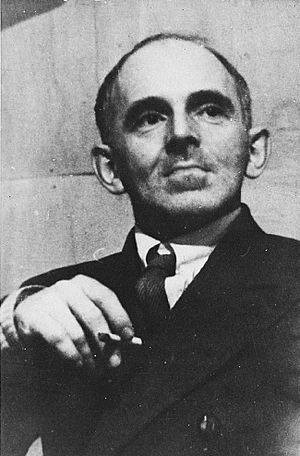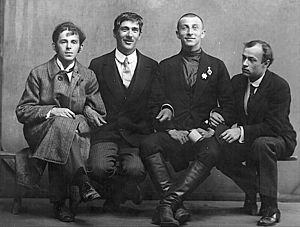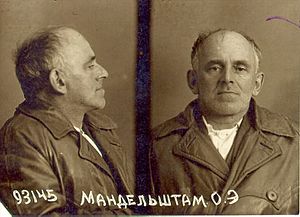Osip Mandelstam facts for kids
Quick facts for kids
Osip Mandelstam
|
|
|---|---|

Osip Mandelstam in 1930s
|
|
| Born | Osip Emilyevich Mandelstam 14 January [O.S. 2 January] 1891 Warsaw, Congress Poland, Russian Empire |
| Died | 27 December 1938 (aged 47) Transit Camp "Vtoraya Rechka" (near Vladivostok), Soviet Union |
| Occupation | Poet, writer, essayist, translator |
| Literary movement | Acmeist poetry, modernism |
| Notable works |
|
| Signature | |
Osip Emilyevich Mandelstam (born January 14, 1891 – died December 27, 1938) was a famous Russian and Soviet poet. He was a key member of the Acmeist group of poets.
Osip Mandelstam faced difficult times during the 1930s in the Soviet Union. He was arrested and sent away from his home with his wife, Nadezhda Mandelstam. Later, they moved to Voronezh in southwestern Russia. In 1938, Mandelstam was arrested again. He was sent to a corrective-labour camp in the Soviet Far East and sadly died there that same year.
Contents
Osip Mandelstam's Early Life and Poetry
Osip Mandelstam was born on January 14, 1891, in Warsaw, which was then part of the Russian Empire. His family was wealthy and Polish-Jewish. His father was a leather merchant. This allowed the family to live outside the special areas where most Jewish people had to stay. Soon after Osip was born, his family moved to Saint Petersburg.
In 1900, Mandelstam started attending the well-known Tenishev School. His first poems were published in the school's magazine in 1907. While at school, he met members of a group called the Socialist Revolutionary Party.
Education and Literary Beginnings
In April 1908, Mandelstam decided to study literature and philosophy at the Sorbonne in Paris. However, he left the next year to go to the University of Heidelberg in Germany. In 1911, he continued his education at the University of Saint Petersburg. Jewish students were not usually allowed there. To get in, he converted to Methodism and joined the university that same year. He did not finish a full degree.
Mandelstam's poetry was very much about the common people after the Russian Revolution of 1905. It also used many images from a style called Symbolism. In 1911, he and other young Russian poets formed a group called the "Poets' Guild." Nikolai Gumilyov and Sergei Gorodetsky led this group. The main poets in this group became known as Acmeists. Mandelstam wrote an important paper for this new movement called The Morning Of Acmeism in 1913. In the same year, he published his first book of poems, The Stone. It was re-released in 1916 with more poems.
Career, Challenges, and Later Life
In 1922, Mandelstam and his wife, Nadezhda, moved to Moscow. Around this time, his second book of poems, Tristia, was published in Berlin. For several years after that, he mostly stopped writing poetry. Instead, he focused on essays, literary criticism, and memoirs like The Noise Of Time and Feodosiya. He also wrote short stories such as The Egyptian Stamp. To earn money, he translated many books into Russian. He translated 19 books in six years. Later, he worked as a newspaper reporter.

First Arrest and Exile
In the autumn of 1933, Mandelstam wrote a poem called "Stalin Epigram." He read this poem at a few small private gatherings in Moscow. The poem was critical of the Soviet leader Joseph Stalin. Six months later, on May 16–17, 1934, Mandelstam was arrested by officers from the NKVD, the Soviet secret police. They had a search warrant for his home. During questioning, he was shown a copy of the "Stalin Epigram." He immediately said he wrote it, believing a poet should never deny their own work. He and Nadezhda had never written it down, so someone who heard it must have shared it with the police.
Mandelstam thought that criticizing Stalin could lead to the death penalty. But Nadezhda and his friend Anna Akhmatova worked hard to help him. They created a lot of attention around his case. The Lithuanian ambassador in Moscow, Jurgis Baltrušaitis, even warned people that a famous poet might be killed. Boris Pasternak, another well-known poet, asked an important official, Nikolai Bukharin, to help. Bukharin knew the Mandelstams and had often helped them. He spoke to the head of the NKVD and wrote a note to Stalin.
On May 26, Mandelstam was not sentenced to death. Instead, he was sent away for three years to Cherdyn in the Northern Ural mountains. His wife went with him. This was seen as a "miracle." However, the stress of his arrest had affected Mandelstam's mental health. His brother asked the police for him to get medical help. On June 10, another "miracle" happened. Mandelstam was still banned from the twelve largest Soviet cities, but he could choose where he would live in exile.
Mandelstam and his wife chose Voronezh. In April 1935, he wrote a short poem that played on the name Voronezh. Soon after they arrived, Boris Pasternak received a surprising phone call from Stalin. Stalin wanted to know if Mandelstam was truly a talented poet. During these three years, Mandelstam wrote many poems known as the Voronezh Notebooks. He and his wife did not feel safe from arrest.
Second Arrest and Death

Mandelstam's three-year exile ended in May 1937. This was during a time called the Great Purge, when many people were arrested. The winter before, he had tried to protect himself by writing an "Ode to Stalin." The couple could no longer live in Moscow. They stayed in nearby Kalinin (Tver) and visited Moscow, relying on friends for a place to stay. In the spring of 1938, Mandelstam met with Vladimir Stavsky, the head of the Writers' Union. Stavsky offered him a two-week holiday. This was a trick. Stavsky had already written to the head of the NKVD, Nikolay Yezhov, accusing Mandelstam. Getting him out of Moscow made it easier to arrest him quietly. He was arrested on May 5 while on holiday. He was accused of "counter-revolutionary activities."
Four months later, on August 2, 1938, Mandelstam was sentenced to five years in labor camps. He arrived at the Vtoraya Rechka (Second River) transit camp near Vladivostok in Russia's Far East.
On December 27, 1938, Osip Mandelstam died in the transit camp from typhoid fever. He was almost 48 years old. His body was not buried until spring, along with others who had died. Then, they were all buried in a mass grave.
Mandelstam had once said, "Only in Russia is poetry respected, it gets people killed." His wife, Nadezhda, wrote memoirs about their life together in Hope against Hope (1970) and Hope Abandoned. She also managed to save many of Mandelstam's poems that had not been published.
Marriage and Family Life
In the 1910s, Osip Mandelstam was secretly in love with a Georgian princess named Salomea Andronikova. He dedicated his poem "Solominka" (1916) to her.
In 1922, Mandelstam married Nadezhda Mandelstam in Kyiv, Ukraine. They then settled in Moscow. Nadezhda Mandelstam became a lifelong friend of Anna Akhmatova. Akhmatova was visiting the Mandelstams when Osip was first arrested.
During Mandelstam's years of imprisonment, from 1934 to 1938, Nadezhda went with him into exile. It was very dangerous because all copies of Osip's poetry could be destroyed. So, she worked to memorize all his poems. She also hid and saved some of his paper manuscripts. All this time, she was trying to avoid being arrested herself. In the 1960s and 1970s, when the political situation became less strict, she was very important in arranging for Mandelstam's poetry to be published secretly.
Osip Mandelstam's Legacy
- The Dutch composer Marjo Tal (1915–2006) created music for several of Mandelstam's poems.
- In 1956, during a time called the Khrushchev thaw, Mandelstam was officially cleared of the charges against him from 1938. This is called rehabilitation.
- The Canadian Broadcasting Corporation aired a radio play called Hope Against Hope on February 1, 1972. It was about Mandelstam's poetry and based on Nadezhda Mandelstam's book.
- In 1977, a small planet was named after him: 3461 Mandelshtam. It was discovered by Soviet astronomer Nikolai Stepanovich Chernykh.
- On October 28, 1987, during the time of Mikhail Gorbachev, Mandelstam was also cleared of the 1934 charges. This meant he was fully rehabilitated.
- In 1998, a monument was built in Vladivostok to remember him.
- In 2020, Noemi Jaffe, a Brazilian writer, wrote a book about his struggles and how his wife saved his work. The book is called "What she whispers."
- In 2021, an album called Sokhrani moyu rech' navsegda (meaning "Save My Words Forever") was released. It honored Mandelstam's 130th birthday. The album features songs based on his poems by artists like Oxxxymiron and Noize MC.
Images for kids
See also
 In Spanish: Ósip Mandelshtam para niños
In Spanish: Ósip Mandelshtam para niños

